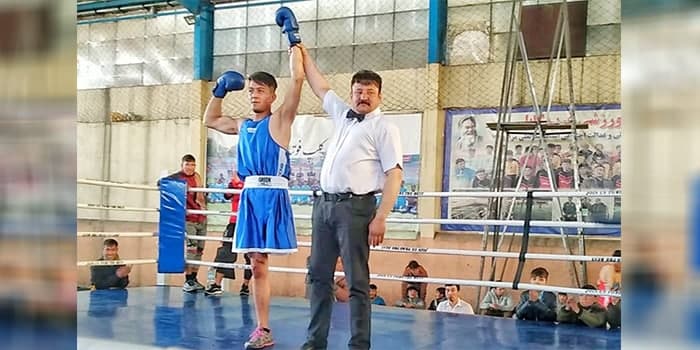The crowd of spectators became dumbfounded as Abdul Ahad, a young boxer with a disability, knocked out his rival who had no physical disability. Ahad’s victory brought a marked sign of happiness and self-confidence on his face. His breathtaking move changed the perception of the crowd of spectators. Abdul Ahads’s victory tells a wonderful story about human willpower.
When Abdul Ahad was a 10-year-old child, his father married a new wife and left Ahad, his mother, and his six siblings alone. As the eldest son of the family, Ahad found himself the sole breadwinner of his family in the absence of his father. “My father left us without officially divorcing my mother. For two to three weeks, we were helped by our relatives and neighbors, which was not enough,” says Abdul Ahad.
For three years, Ahad collected firewood for his mother, who then would bake bread for people in her neighborhood in exchange for money. “The day my father left [us], life became tougher than before. My mother started baking bread, which was the only source of income to support us,” he said.
One day in 2008 Abdul Ahad stepped on a planted land mine while busy collecting firewood in the hill of Deh e Sabz, in an area on the outskirt of Kabul. “While coming down the hill and collecting firewood, I stepped on a mine and lost my left leg. 18 days later I found myself at a hospital as regained my consciousness. I saw my left leg amputated. I got furious and broke glasses near me, but the doctor calmed me down with an injection.”
The ongoing war has left a large number of Afghans with physical disabilities. Figures provided by the International Red Cross Committee, ICRC Afghanistan office, suggest that more than one million people are suffering from different kinds of disabilities in the country with 10,000 new Persons with Disabilities, PWDs are registered on annual basis. The ICRC office detailed that more than 29,000 people have lost a part of their bodies as a result of mine and IED blasts.
It was not easy for Abdul Ahad to come to terms with the life-long wound the mine explosion inflicted on his body. But he did everything he could do to recollect his willpower to overcome the mental pain and physical suffering caused by the loss of his leg. “After I was discharged from the hospital and came back home, everyone in my family expected me to continue as the breadwinner,” Abdul Ahad said.
Perhaps it was a deep instinct of survival or a blood-knotted love of family that pushed Abdul Ahad to stand on his own and struggle to survive. “I was unable to attend school for two years. Along with my studies, I kept weaving carpet and attending a six-month-training of repairing phones arranged by ICRC,” he says.
The training helped Abdul Ahad learn the basics of cell phone repairing. After years of working, he finally managed to open a small cellphone repairing shop.
It was in his cellphone shop where he was befriended by Rahmatullah Akbari who was a professional boxer. “Rahmatullah was a good boxer and after each victory, he would come to me with medals and certificates. I was inspired by him and slowly got the motivation to attend boxing club,” Abdul Ahad said.
The decision to join a boxing club made him the subject of mockery by many people. “I tried to find ways to step out of the boundary created by people. This was a reason to give me a try whether I can be a boxer with one leg or not,” he said.
During his professional training, Abdul Ahad received different comments. Some would admire his courage while a handful of people would always make his ambition a subject of mockery.

Many traditional families in Afghanistan see disability as a “shame” or stigma on the faces of family members. Most often, people call persons with disabilities not by their names but by the defects disabilities have left on them. Many persons with disabilities feel directly neglected by family members and individuals in society.
Ahad never gave up.
To prove the cynics wrong, he recollected his power to become a good boxer. He is now a member of Omid Maiwand Boxing Club in Kabul. Abdul Ahad participated and won many competitions without using a prosthetic leg.
In 2019, he contested in a running competition. Out of 800 participants, Abdul Ahad got the third position, running five kilometers from Dar ul Aman Palace to Alauddin Highway. “It was a difficult race. I fell several times but I succeeded to continue till the end with one leg and two wands to get the third position,” he said.
Nowadays, Abdul Ahad wakes up at four in the morning. He rides 12 km to get to university. In the afternoon, he weaves carpets until 4:00 PM. He goes to the boxing club and exercises after 4:00 PM every afternoon.
Abdul Ahad, 25, wishes to climb the peak of fame and become as famous as Mike Tyson. His aim is to motivate people with disabilities to step beyond the boundaries and strive for success. “My goal is to achieve more success in boxing and become an MP in the future just to prove that the persons with disabilities are also able to achieve their dreams,” he said.
Amputation can have a devastating effect on a person’s body, self-image, and self-confidence. Abdul Ahad’s highflying determination and self-confidence make him a truly unique fighter who is fighting to prove that nothing even amputation can overcome human willpower.
The story has been developed by Etilaat-e-Roz’s Hadi Khoshnawis and translated into English by Fatema Hosseini.




